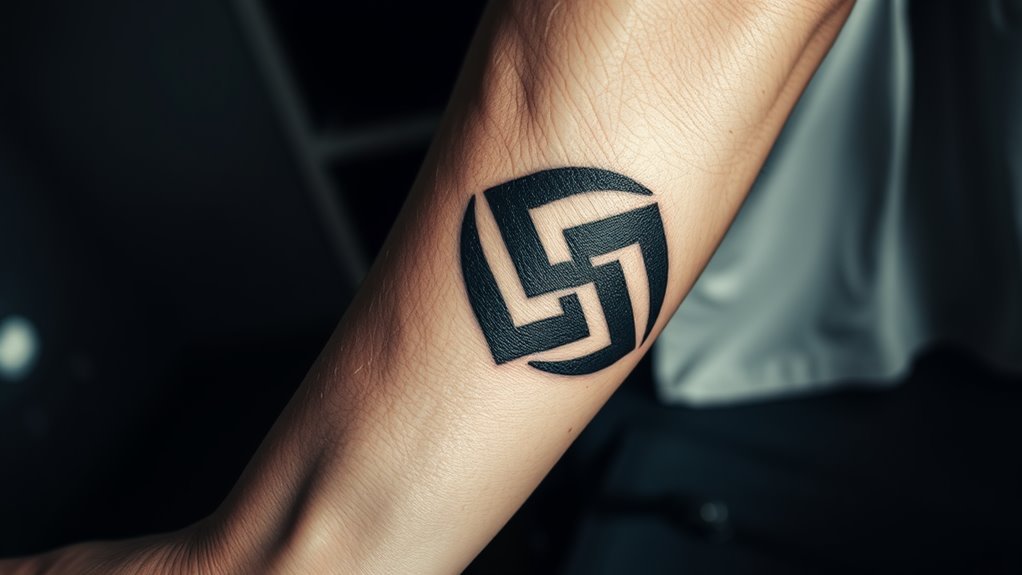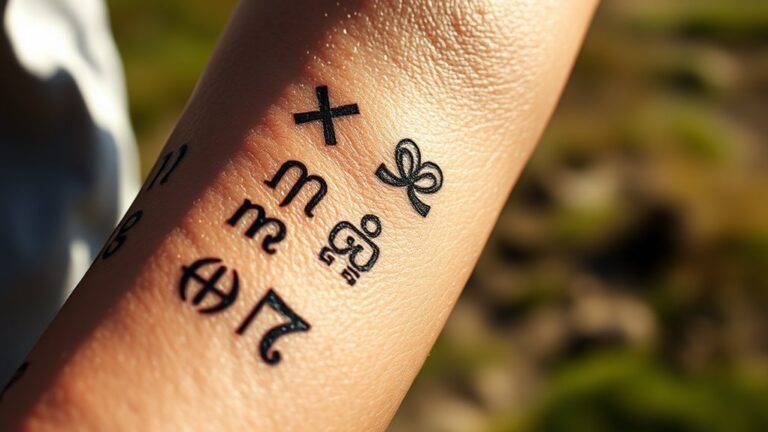Nazi Tattoo Meaning and Symbolism
Nazi tattoos are more than mere body art; they signify deep-seated ideologies and a quest for identity within extremist circles. These symbols, like the swastika and SS lightning bolts, carry historical weight and psychological implications that extend beyond their ink. What drives individuals to adopt such designs? Understanding the motivations and meanings behind these tattoos can illuminate broader societal issues and provoke critical conversations about hate and belonging. What can we learn from this?
In a Nutshell
- Nazi tattoos often symbolized allegiance to the regime, conveying loyalty and identity among extremist circles.
- Common designs included eagles, SS lightning bolts, and swastikas, each representing power, loyalty, and hate, respectively.
- The swastika evolved from a symbol of good fortune to an emblem of hate, raising issues of cultural appropriation.
- Tattoos served as markers of personal connection to extremist ideologies, creating emotional ties that complicate societal relationships.
- Legal implications vary globally; Nazi symbols may be banned in some countries while allowed in others, impacting social acceptance.
Historical Origins of Nazi Tattoos
When you explore the historical origins of Nazi tattoos, you uncover a complex interplay between symbolism and ideology.
In Nazi Germany, tattoo culture emerged as a means of marking identity, loyalty, and belonging within a tightly-knit community. The historical context reveals that these tattoos often conveyed messages of racial superiority, militarism, and devotion to the regime.
Their ideological significance lay in reinforcing the collective identity of those who adhered to Nazi beliefs, using ink as a permanent statement of allegiance.
As you investigate deeper, you might find yourself questioning how such symbols shifted from personal expression to instruments of control and conformity.
Understanding these origins invites you to reflect on the profound impact of tattoos in shaping both individual identities and broader societal narratives.
Common Nazi Tattoo Designs
Nazi tattoo designs often serve as stark symbols of the regime's ideology, encapsulating a range of meanings that speak to the beliefs of those who wore them.
These tattoos, steeped in Nazi symbolism, often reflect a desire for belonging and identity within extremist circles. You might encounter various designs that stand out due to their stark imagery and historical significance, including:
- Eagles: Representing power and dominance, often associated with the Nazi regime.
- SS Lightning Bolts: Symbolizing loyalty to the Schutzstaffel, they evoke a sense of camaraderie among followers.
- Skulls: Used to signify death and intimidation, they often embody the dark allure of tattoo artistry within this context.
These designs reveal the complex interplay of identity, ideology, and rebellion that permeates this controversial aspect of history.
The Swastika: An Ancient Symbol Turned Hate Mark
Although the swastika has ancient origins as a symbol of good fortune and prosperity in various cultures, its appropriation by the Nazis transformed it into a powerful emblem of hate and oppression.
This shift raises important questions about cultural appropriation and the responsibility that comes with using symbols. How can something once celebrated for its ancient significance become a mark of terror?
As you explore the implications of the swastika, consider how its meaning has evolved and the impact it has on those who see it today. Engaging with this symbol requires acknowledging its complex history and the pain it represents for many.
The SS Lightning Bolts: Significance and Impact
While many symbols can evoke strong emotions, the SS lightning bolts stand out due to their direct association with the feared Schutzstaffel, or SS, an elite paramilitary organization under Adolf Hitler.
These bolts embody a chilling historical context, representing a dark chapter in humanity's past. Understanding their significance in tattoo artistry requires you to contemplate:
- The lightning bolt's design as a marker of loyalty to extremist ideologies.
- The cultural appropriation involved when these symbols are misused in modern contexts.
- The ongoing impact of SS symbolism on societal perceptions and identity.
The Iron Cross: Military Honor or Extremist Symbol?
The Iron Cross, often perceived as a symbol of military valor and honor, has taken on a more complex identity over the years, particularly within extremist circles.
While it originally represented bravery in battle, its appropriation by neo-Nazi groups raises questions about its current meaning. You might wonder how a symbol of courage can morph into something associated with intolerance.
This cultural appropriation dilutes its historical significance and creates tension between genuine military admiration and extremist ideologies. As you explore this duality, consider how symbols evolve within societal contexts, often reflecting deeper psychological needs for belonging and identity.
What does wearing the Iron Cross signify today? Is it a tribute to valor or a troubling embrace of extremist ideologies?
The Numbers: Personal Identification and Their Meanings
As you explore the world of Nazi tattoos, you'll find that numbers hold significant weight as personal identifiers, each carrying a deep-seated meaning tied to the ideologies of their wearers.
These numerical symbols often reflect personal significance and can reveal much about one's beliefs or affiliations.
Consider the following aspects of numerical symbolism:
- Birthdates: Many choose numbers that represent critical life events, suggesting a personal connection to ideology.
- Codes: Certain sequences may serve as coded messages, conveying hidden meanings within extremist circles.
- Historical Dates: Tattoos might commemorate pivotal moments in history, showcasing loyalty to specific events or figures.
Understanding these numbers offers insight into the complex motivations behind Nazi tattoos, inviting you to reflect on the broader implications of these choices.
The Role of Tattoos in Nazi Ideology
Tattoos in Nazi ideology serve more than just aesthetic purposes; they symbolize allegiance and identity within a deeply ingrained belief system. For those immersed in this culture, tattoo significance transcends mere ink on skin; it becomes a powerful form of identity expression.
You might wonder how these markings reinforced a sense of belonging among adherents. Each design carried messages of loyalty, strength, and racial purity, creating an unbreakable bond among members.
As you explore these tattoos, consider how they functioned as both personal and collective symbols, fostering unity while delineating boundaries between the "in-group" and outsiders. Reflecting on this, you'll see that tattoos weren't only personal choices but also essential elements of a larger ideology, shaping identities in profound ways.
Modern Context: Neo-Nazi Groups and Tattoo Culture
While many might associate tattoos with personal expression, in the domain of neo-Nazi groups, they often serve as potent markers of ideology and affiliation. You might wonder how tattoo culture intertwines with neo-Nazi symbolism. These tattoos often signal loyalty and a sense of belonging within a tightly-knit community.
Consider these common elements:
- Symbols of supremacy: Tattoos often feature imagery that promotes white nationalism.
- Ritualistic significance: Getting inked can serve as a rite of passage, solidifying one's commitment to the group.
- Rebellious identity: Many wear these tattoos as a defiance against mainstream society, seeking camaraderie among like-minded individuals.
Psychological Implications of Nazi Tattoos
The choice to adorn oneself with Nazi tattoos often reflects deeper psychological motivations that extend beyond mere aesthetics or group affiliation.
You might find that these tattoos serve as identity expression, linking individuals to a shared narrative of resilience amidst societal rejection. Many carry emotional attachments to these symbols, viewing them as markers of personal redemption from psychological trauma.
However, such expressions invite cultural stigma, complicating their relationship with the outside world. You may wonder about the balance between seeking belonging within a group and the implications of embracing such a controversial past.
Ultimately, exploring these tattoos can reveal the complexities of human psychology, where the desire for connection often clashes with the burden of historical context.
Legal Ramifications and Societal Responses
Legal ramifications surrounding Nazi tattoos vary markedly across different countries, reflecting a complex interplay between freedom of expression and societal values.
In some places, sporting these symbols can lead to significant legal consequences, while in others, you might face societal backlash rather than formal penalties.
It's worth considering how these differences impact individuals and communities.
- In Germany, Nazi symbols are largely banned, leading to potential criminal charges.
- In the U.S., while legal to display, it can result in severe social ostracization.
- Some countries enforce penalties that include fines or imprisonment for promoting hate symbols.
Navigating these legal landscapes raises questions about personal identity and the societal norms you wish to align with.
How do you reconcile your choices with the broader implications?
Moving Forward: Education and Awareness Against Hate Symbols
Maneuvering the complex legal landscapes surrounding Nazi tattoos underscores a pressing need for education and awareness to combat the harmful ideologies these symbols represent.
You might wonder how education initiatives can reshape perceptions and foster understanding. Community outreach and awareness campaigns play essential roles in creating dialogues about historical education and symbol interpretation.
By incorporating tolerance workshops and youth programs, you can encourage critical thinking and empathy among younger generations. This proactive approach not only aligns with hate speech laws but also cultivates a sense of belonging in diverse communities.
As you engage in these educational efforts, consider how collective awareness can dismantle hate and promote a more inclusive society, ensuring that the lessons of the past inform a brighter future.
Frequently Asked Questions
Can Nazi Tattoos Be Removed, and What Are the Options?
If you're feeling tattoo regret, laser removal offers a viable option. It effectively targets ink while minimizing skin damage. Consider consulting a professional to explore your choices and find the best path forward for you.
Are There Any Positive Meanings Associated With Nazi Symbols Today?
You might find that many view Nazi symbols solely through their historical context, often rejecting any notion of positive meanings. Exploring cultural appropriation reveals complex discussions, but it's essential to recognize the pain these symbols evoke for many.
How Do Former Nazis Feel About Their Tattoos Later in Life?
As you reflect on your past, tattoo regret often emerges. Many former Nazis experience an identity transformation, questioning their earlier choices. How do these tattoos shape their current sense of belonging and self-acceptance later in life?
What Are Common Misconceptions About Nazi Tattoos?
You might think Nazi tattoos only represent hate, but they're often misunderstood symbols lacking historical context. Many people overlook the complex stories behind these tattoos, leading to misinterpretations that ignore individual experiences and journeys of transformation.
How Do Tattoos Affect Societal Perceptions of Individuals With Them?
Tattoos often shape societal perceptions, influencing how you're viewed based on social stigma attached to body art. They can reflect personal identity, provoking curiosity or judgment. How do you navigate these complex reactions in your daily interactions?







